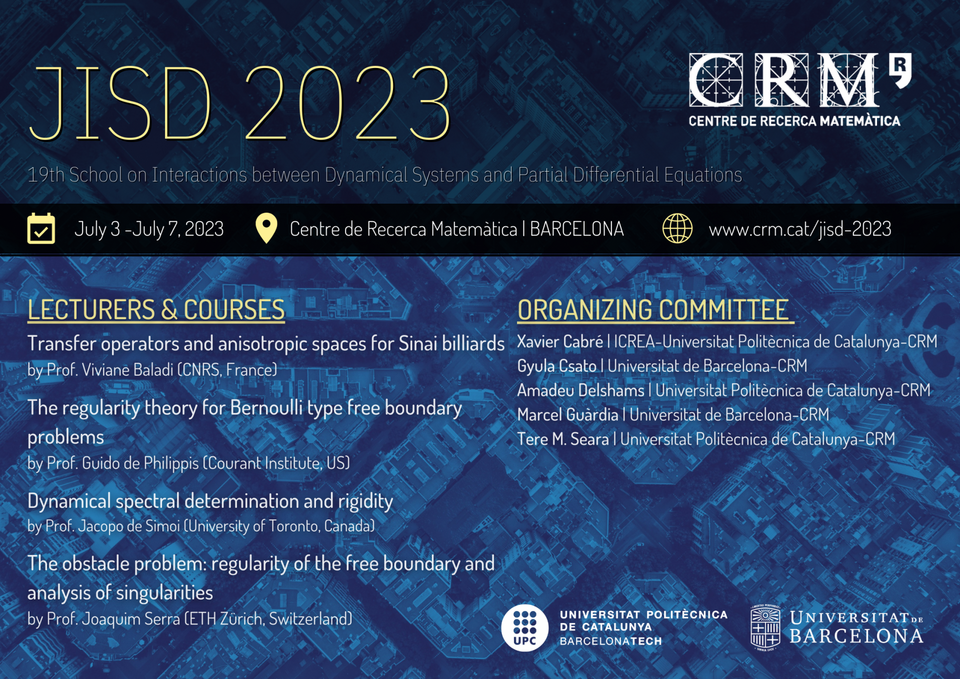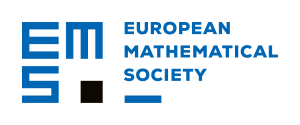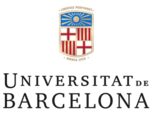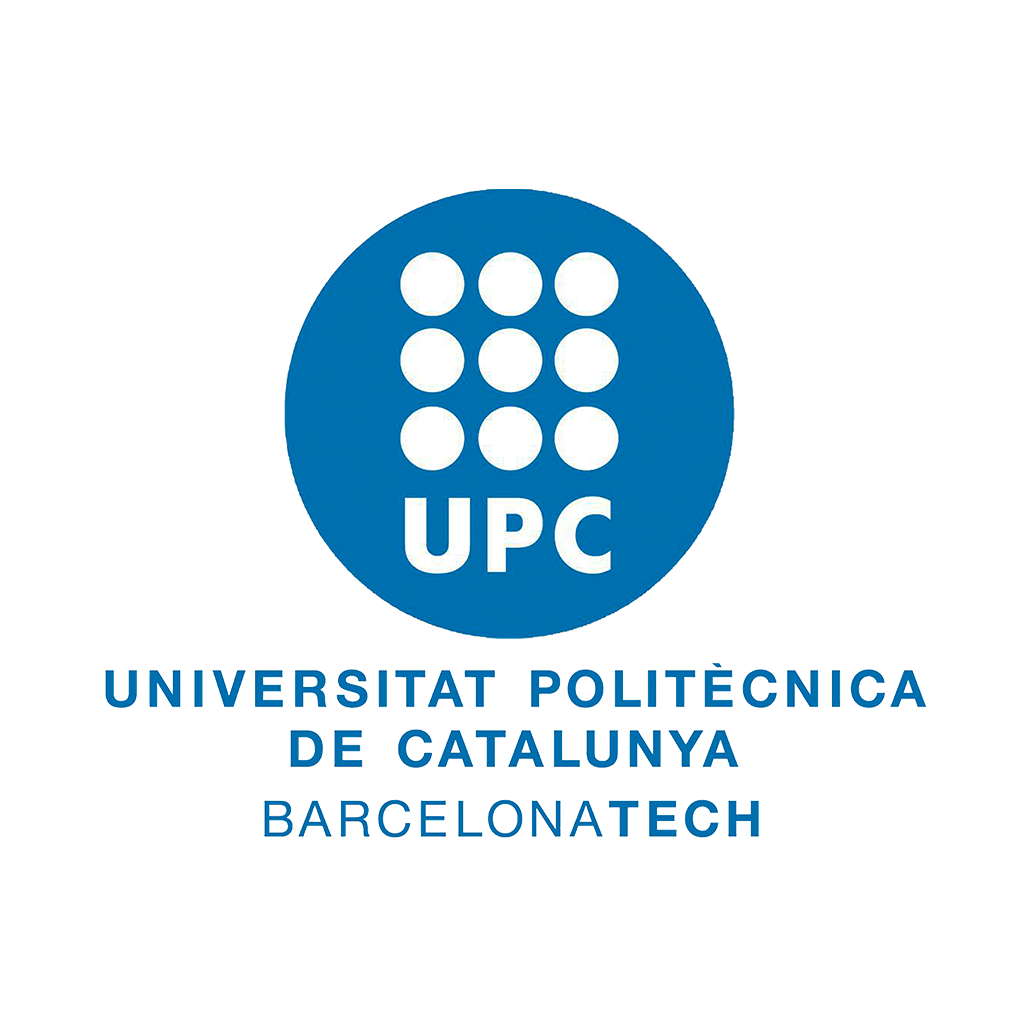Organised in partnership with the  Clay Mathematics Institute
Clay Mathematics Institute
19th School on Interactions Between Dynamical Systems and Partial Differential Equations (JISD2023)
Sign into July 07, 2023
Registration includes coffee breaks and lunch.
The School will take place at the AUDITORIUM of the CRM.
SCHEDULE
JISD PAST EDITIONS
We will present an approach to the statistical properties of two-dimensional dispersive billiards (discrete and continuous-time) using transfer operators acting on anisotropic Banach spaces of distributions. After recalling some classical background (Bunimovich, Sinai, Chernov, etc) based on other approaches, we will survey results by Demers, Zhang, Liverani, etc, joint work with Demers and Liverani on the SRB measure of flows, joint work with Demers on the measure of maximal entropy and other equilibrium states of maps, and joint work with Carrand and Demers on the measure of maximal entropy for flows.
Organizing Committee
| Xavier Cabré | ICREA-Universitat Politècnica de Catalunya-CRM |
| Gyula Csato | Universitat de Barcelona-CRM |
| Amadeu Delshams | Universitat Politècnica de Catalunya-CRM |
| Marcel Guàrdia | Universitat de Barcelona-CRM |
| Tere M. Seara | Universitat Politècnica de Catalunya-CRM |
Scientific Committee
| Scott Armstrong | Courant Institute, New York University |
| Jean Pierre Eckmann | Université de Genève |
| Jean-Michel Roquejoffre | Paul Sabatier University |
| Susanna Terracini | Università de Torino |
List of participants
| Name | Institution |
|---|---|
| Prosenjit Roy | IIT Kanpur |
| Xavier Tolsa Domènech | ICREA, Universitat Autònoma de Barcelona, and CRM |
| Ezequiel Maderna | Universidad de la República |
| Giuseppe La Scala | Scuola Superiore Meridionale |
| Mar Giralt Miron | Observatoire de Paris |
| Andrew Clarke | Universitat de Barcelona |
| Alejandro Haro Provinciale | Universitat de Barcelona |
| Xavier Ros Oton | Universitat de Barcelona |
| Marvin Weidner | Universitat de Barcelona |
| Clara Torres Latorre | Universitat de Barcelona |
| Marina Gonchenko | Universitat de Barcelona |
| Marcel Guardia Munárriz | Universitat de Barcelona |
| Gyula Csato | Universitat de Barcelona |
| Joan Verdera | Universitat Autònoma de Barcelona |
| Miguel Garrido | Universitat Autònoma de Barcelona |
| Josep M Gallegos | Universitat Autònoma de Barcelona |
| Ignasi Guillén-Mola | Universitat Autònoma de Barcelona |
| Carles Trullàs Fernàndez | Universitat Autònoma de Barcelona |
| Marc Magaña Centelles | Universitat Autònoma de Barcelona |
| José Lamas Rodríguez | Universitat Politècnica de Catalunya |
| Pau Martín de la Torre | Universitat Politècnica de Catalunya |
| Vicent Navarro | Universitat Politècnica de Catalunya |
| Maria Teresa Martinez-Seara Alonso | Universitat Politècnica de Catalunya |
| Xavier Cabré Vilagut | Universitat Politècnica de Catalunya |
| Alexandra Lillo Escuder | Universitat Politècnica de Catalunya |
| Albert Mas Blesa | Universitat Politècnica de Catalunya |
| Joan Solà-Morales | Universitat Politècnica de Catalunya |
| Renzo Bruera | Universitat Politècnica de Catalunya |
| Olli Saari | Universitat Politècnica de Catalunya |
| Amadeu Delshams i Valdés | Universitat Politècnica de Catalunya |
| Jorge Ruiz Cases | Universidad Autónoma de Madrid |
| Iñigo Urtiaga Erneta | Rutgers |
| Thaylon Souza de Oliveira | University of Campinas |
| Luan Vinicio de Mattos Ferreira Silva | University of Campinas |
| Matija Livaic | University of Zagreb |
| Max Goering | University of Jyväskylä |
| Tristan Cheny | École Polytechnique |
| Santiago Barbieri | University of Paris-Sud |
| Alessandro Cosenza | Paris Diderot University - Paris 7 |
| Andrey Stavitskiy | RWTH Aachen University |
| Airi Takeuchi | University of Augsburg |
| Alessandra Nardi | University of Padua |
| Francesco Monzani | University of Milan |
| Davide Giovagnoli | University of Bologna |
| Davide Polimeni | University of Turin |
| Irene De Blasi | University of Turin |
| GABRIELE ALFONSO | University of Naples Federico II |
| Roberto Ognibene | University of Pisa |
| Liangjun Weng | University of Rome Tor Vergata |
| Alberto Roncoroni | Polytechnic University of Milan |
| Emanuele Salato | Polytechnic University of Turin |
| Gabriele Fioravanti | Polytechnic University of Turin |
| Lorenzo Baroni | Roma Tre University |
| Filippo Gaia | Swiss Federal Institute of Technology in Zurich |
| Giacomo Colombo | Swiss Federal Institute of Technology in Zurich |
| Matilde Gianocca | Swiss Federal Institute of Technology in Zurich |
| Xiangqian Meng | University of Washington - Seattle |
| Emily Casey | University of Washington - Seattle |
| Ignacio Tejeda | University of Washington - Seattle |
| Dídac Gil Rams | Centre de Recerca Matemàtica |
| Niyaz Tokmagambetov | Centre de Recerca Matemàtica |
| Joaquim Duran i Lamiel | Centre de Recerca Matemàtica |
poster session information
To apply, please select the relevant option during the registration process.
- Deadline: April 18th, 2023.
- Resolutions will be sent on May 26th, 2023.
Registration
The registration fee includes coffee breaks and lunch.
- You will be asked to create a CRM web user account before registering to the activity through the following link:
CRM USER CREATION
grants
| Application deadline for grants is April 18, 2023 |
| Notifications will be sent on May 26, 2023 |
| New deadline for payment to confirm acceptance of grant will be June 4, 2023. |
INVOICE/PAYMENT INFORMATION
IF YOUR INSTITUTION COVERS YOUR REGISTRATION FEE: Please note that, in case your institution is paying for the registration via bank transfer, you will have to indicate your institution details and choose “Transfer” as the payment method at the end of the process.
UPF | UB | UPC | UAB
*If the paying institution is the UPF / UB/ UPC / UAB, after registering, please send an email to comptabilitat@crm.cat with your name and the institution internal reference number that we will need to issue the electronic invoice. Please, send us the Project code covering the registration if needed.
Paying by credit card
IF YOU PAY VIA CREDIT CARD but you need to provide the invoice to your institution to be reimbursed, please note that we will also need you to send an email to comptabilitat@crm.cat providing the internal reference number given by your institution and the code of the Project covering the registration (if necessary).
Lodging information
ON-CAMPUS AND BELLATERRA
BARCELONA AND OFF-CAMPUS
|
For inquiries about this event please contact the Scientific Events Coordinator Ms. Núria Hernández at nhernandez@crm.cat
|













